Philipp Wanko
Strong Equivalence in Answer Set Programming with Constraints
Feb 06, 2025Abstract:We investigate the concept of strong equivalence within the extended framework of Answer Set Programming with constraints. Two groups of rules are considered strongly equivalent if, informally speaking, they have the same meaning in any context. We demonstrate that, under certain assumptions, strong equivalence between rule sets in this extended setting can be precisely characterized by their equivalence in the logic of Here-and-There with constraints. Furthermore, we present a translation from the language of several clingo-based answer set solvers that handle constraints into the language of Here-and-There with constraints. This translation enables us to leverage the logic of Here-and-There to reason about strong equivalence within the context of these solvers. We also explore the computational complexity of determining strong equivalence in this context.
Routing and Scheduling in Answer Set Programming applied to Multi-Agent Path Finding: Preliminary Report
Mar 18, 2024Abstract:We present alternative approaches to routing and scheduling in Answer Set Programming (ASP), and explore them in the context of Multi-agent Path Finding. The idea is to capture the flow of time in terms of partial orders rather than time steps attached to actions and fluents. This also abolishes the need for fixed upper bounds on the length of plans. The trade-off for this avoidance is that (parts of) temporal trajectories must be acyclic, since multiple occurrences of the same action or fluent cannot be distinguished anymore. While this approach provides an interesting alternative for modeling routing, it is without alternative for scheduling since fine-grained timings cannot be represented in ASP in a feasible way. This is different for partial orders that can be efficiently handled by external means such as acyclicity and difference constraints. We formally elaborate upon this idea and present several resulting ASP encodings. Finally, we demonstrate their effectiveness via an empirical analysis.
Towards a Semantics for Hybrid ASP systems
Aug 06, 2021Abstract:Over the last decades the development of ASP has brought about an expressive modeling language powered by highly performant systems. At the same time, it gets more and more difficult to provide semantic underpinnings capturing the resulting constructs and inferences. This is even more severe when it comes to hybrid ASP languages and systems that are often needed to handle real-world applications. We address this challenge and introduce the concept of abstract and structured theories that allow us to formally elaborate upon their integration with ASP. We then use this concept to make precise the semantic characterization of CLINGO's theory-reasoning framework and establish its correspondence to the logic of Here-and-there with constraints. This provides us with a formal framework in which we can elaborate formal properties of existing hybridizations of CLINGO such as CLINGCON, CLINGOM[DL], and CLINGO[LP].
How to build your own ASP-based system?!
Aug 15, 2020
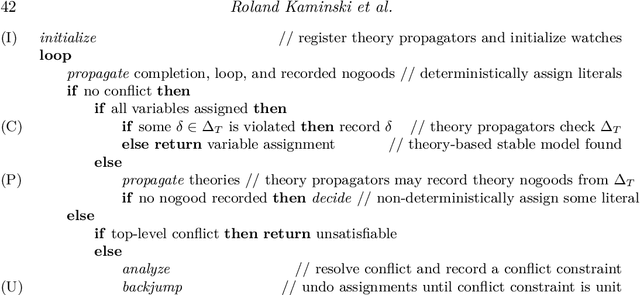
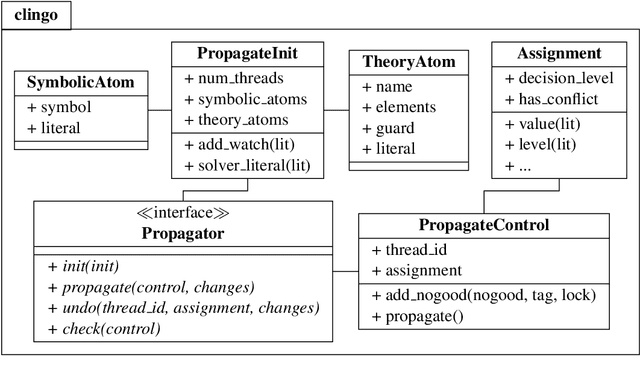
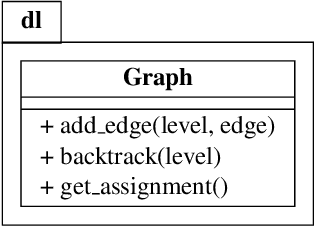
Abstract:Answer Set Programming (ASP) has become a popular and quite sophisticated approach to declarative problem solving. This is arguably due to its attractive modeling-grounding-solving workflow that provides an easy approach to problem solving, even for laypersons outside computer science. Unlike this, the high degree of sophistication of the underlying technology makes it increasingly hard for ASP experts to put ideas into practice. For addressing this issue, this tutorial aims at enabling users to build their own ASP-based systems. More precisely, we show how the ASP system CLINGO can be used for extending ASP and for implementing customized special-purpose systems. To this end, we propose two alternatives. We begin with a traditional AI technique and show how meta programming can be used for extending ASP. This is a rather light approach that relies on CLINGO's reification feature to use ASP itself for expressing new functionalities. Unlike this, the major part of this tutorial uses traditional programming (in PYTHON) for manipulating CLINGO via its application programming interface. This approach allows for changing and controlling the entire model-ground-solve workflow of ASP. Central to this is CLINGO's new Application class that allows us to draw on CLINGO's infrastructure by customizing processes similar to the one in CLINGO. For instance, we may engage manipulations to programs' abstract syntax trees, control various forms of multi-shot solving, and set up theory propagators for foreign inferences. Another cross-sectional structure, spanning meta as well as application programming, is CLINGO's intermediate format, ASPIF, that specifies the interface among the underlying grounder and solver. We illustrate the aforementioned concepts and techniques throughout this tutorial by means of examples and several non-trivial case-studies.
Train Scheduling with Hybrid Answer Set Programming
Mar 19, 2020
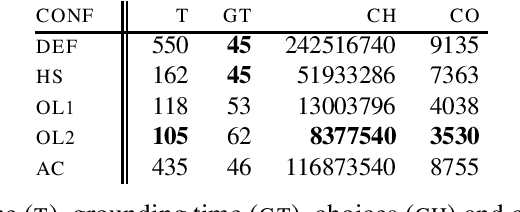
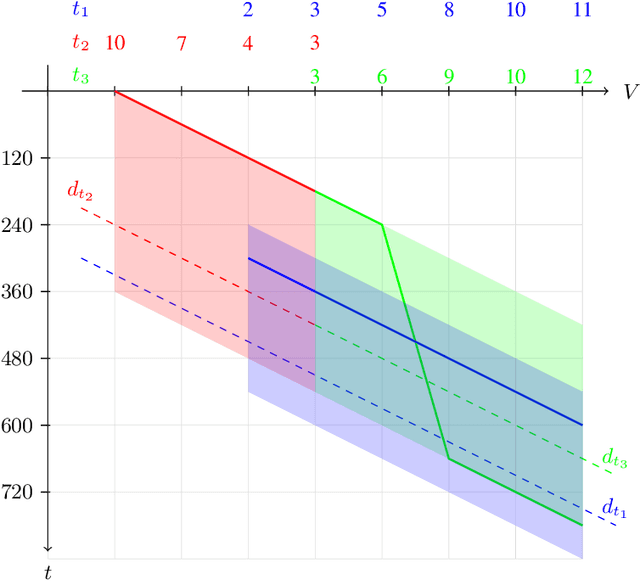
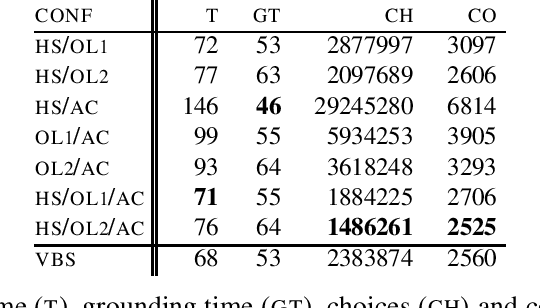
Abstract:We present a solution to real-world train scheduling problems, involving routing, scheduling, and optimization, based on Answer Set Programming (ASP). To this end, we pursue a hybrid approach that extends ASP with difference constraints to account for a fine-grained timing. More precisely, we exemplarily show how the hybrid ASP system clingo[DL] can be used to tackle demanding planning-and-scheduling problems. In particular, we investigate how to boost performance by combining distinct ASP solving techniques, such as approximations and heuristics, with preprocessing and encoding techniques for tackling large-scale, real-world train scheduling instances. Under consideration in Theory and Practice of Logic Programming (TPLP)
A Uniform Treatment of Aggregates and Constraints in Hybrid ASP
Mar 13, 2020Abstract:Characterizing hybrid ASP solving in a generic way is difficult since one needs to abstract from specific theories. Inspired by lazy SMT solving, this is usually addressed by treating theory atoms as opaque. Unlike this, we propose a slightly more transparent approach that includes an abstract notion of a term. Rather than imposing a syntax on terms, we keep them abstract by stipulating only some basic properties. With this, we further develop a semantic framework for hybrid ASP solving and provide aggregate functions for theory variables that adhere to different semantic principles, show that they generalize existing aggregate semantics in ASP and how we can rely on off-the-shelf hybrid solvers for implementation.
An ASP semantics for Constraints involving Conditional Aggregates
Feb 22, 2020Abstract:We elaborate upon the formal foundations of hybrid Answer Set Programming (ASP) and extend its underlying logical framework with aggregate functions over constraint values and variables. This is achieved by introducing the construct of conditional expressions, which allow for considering two alternatives while evaluating constraints. Which alternative is considered is interpretation-dependent and chosen according to an associated condition. We put some emphasis on logic programs with linear constraints and show how common ASP aggregates can be regarded as particular cases of so-called conditional linear constraints. Finally, we introduce a polynomial-size, modular and faithful translation from our framework into regular (condition-free) Constraint ASP, outlining an implementation of conditional aggregates on top of existing hybrid ASP solvers.
Design Space Exploration via Answer Set Programming Modulo Theories
May 07, 2019Abstract:The design of embedded systems, that are ubiquitously used in mobile devices and cars, is becoming continuously more complex such that efficient system-level design methods are becoming crucial. My research aims at developing systems that help the designer express the complex design problem in a declarative way and explore the design space to obtain divers sets of solutions with desirable properties. To that end, we employ knowledge representation and reasoning capabilities of ASP in combination with background theories. As a result, for the first time, we proposed a sophisticated methodology that allows for the direct integration of multi-objective optimization of non-linear objectives into ASP. This includes unique results of diverse sub-problems covered in several publications which I will present in this work.
Clingo goes Linear Constraints over Reals and Integers
Jul 13, 2017
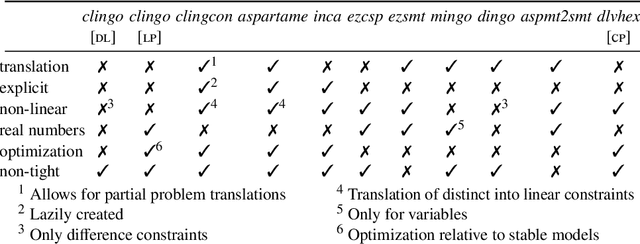
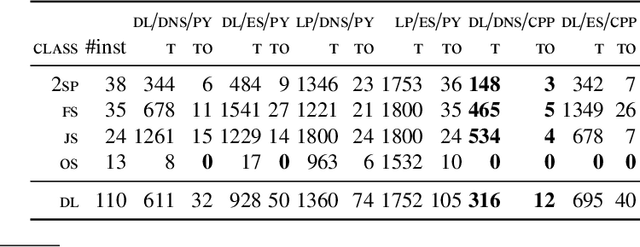
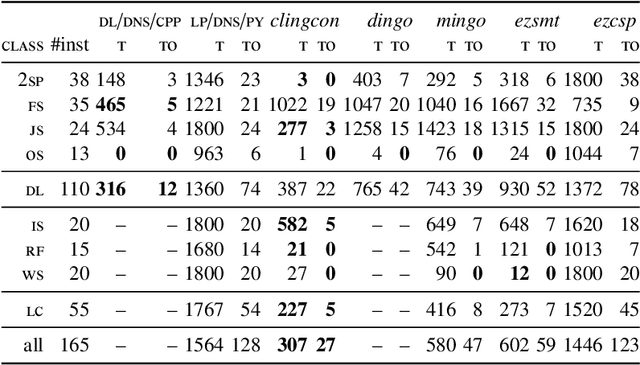
Abstract:The recent series 5 of the ASP system clingo provides generic means to enhance basic Answer Set Programming (ASP) with theory reasoning capabilities. We instantiate this framework with different forms of linear constraints, discuss the respective implementations, and present techniques of how to use these constraints in a reactive context. More precisely, we introduce extensions to clingo with difference and linear constraints over integers and reals, respectively, and realize them in complementary ways. Finally, we empirically evaluate the resulting clingo derivatives clingo[dl] and clingo[lp] on common fragments and contrast them to related ASP systems. This paper is under consideration for acceptance in TPLP.
 Add to Chrome
Add to Chrome Add to Firefox
Add to Firefox Add to Edge
Add to Edge